Shoulder pain has a way of creeping into nearly every part of daily life. Simple movements — like reaching into a cabinet, fastening a seatbelt, getting dressed, or even finding a comfortable sleeping position — can suddenly become frustrating or downright painful....
Sleep plays a vital role in healing, recovery, and overall well-being. Unfortunately, hip pain can make getting a full night’s rest feel nearly impossible. Tossing and turning to find a comfortable position, waking up from sharp or aching pain, or starting the morning...
If you are struggling with lower back pain that radiates down your leg, you might have hit the internet searching for answers, only to find the terms “sciatica” and “herniated disc” discussed frequently. This is because both conditions can cause debilitating back...
Exercises To Get Strong for Spring

Spring is here and summer is just around the corner. Nothing is better than the sight of cherry blossoms in full bloom, or the first lawn being mowed. Southeastern PA has exceptional seasons, and it’s time to take advantage of it.
Every spring, we see an influx of patients suffering from injuries. From overuse injuries like Achilles tendonitis, to traumatic injuries from falling, spring and summer present a myriad of challenges to our bodies. After a long winter of less activity, we are motivated by sunshine and warm weather to enjoy the outdoors. Activities like running and gardening become very popular. Our bodies, however, have often adjusted to the sedentary lifestyle of winter. We need to get our muscles, joints, and bones ready for the tasks ahead.
Here are a few simple exercises you can perform to get stronger and reduce your chance of injury.
EXERCISE 1: Farmer’s Walks
How many times a week do you carry something heavy? Whether it’s grocery bags, or carrying out the trash, we often have to move objects from one place to another. You can and should turn this into an exercise. I am talking about one of my favorite exercises, Farmer’s walks. Farmer’s walks can improve balance, cardiovascular endurance, and strength.
How to do it: Find a pair of weights or heavy objects you can hold onto. Find a safe place to walk. Pick up the objects with good form, then set your shoulders back and keep your head upright. Now all you have to do is walk. A good length is 50-100ft, at a slow pace. You should feel fatigued by the end of your walk. Take a rest and do it again. Try 3-4 laps.
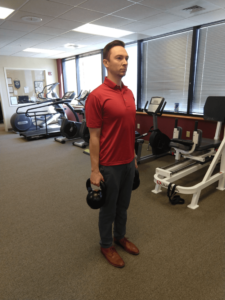
What if it’s too easy? Pick up heavier weights or walk a longer distance.
What if it’s too hard? Find lighter weights or decrease the distance walked.
EXERCISE 2: Squats
Getting out of a chair or bending down to pick something up, we squat all throughout the day. Why not take this fundamental movement, and turn it into an exercise? Squatting can make your outdoor sports and hobbies much easier by strengthening your legs and hips, and even improving your balance.
How to do it: Stand with your feet shoulder width apart. Bend at your knees and your hips, bringing your hips closer to the floor and your shoulders slightly forward. Your weight should be evenly distributed from the front of your foot to the back of your foot, and your knees should be slightly wider than your feet. Squat as low as you can without allowing your heels to lift up, then stand back up. Perform 8-15 repetitions for 3 sets.
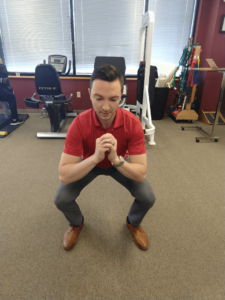
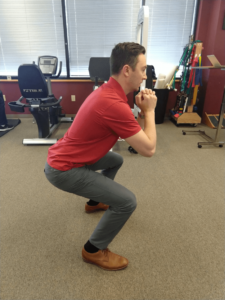
What if it’s too easy? Pick up a weight or heavy object and hold it at chest level. Keep your shoulder blades pinched together.
What if it’s too hard? Sit down to a chair and stand back up. A chair can make this exercise manageable for those who find squatting with good form difficult.
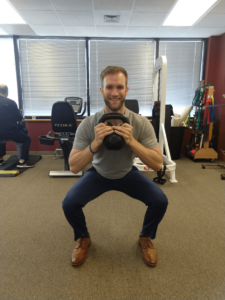
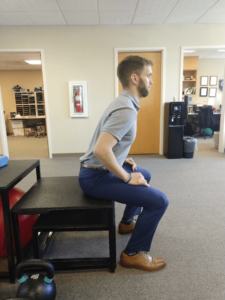
EXERCISE 3: Planks
You may have already heard this, but we use our “core” all the time. Our “core” represents the muscles that keep us upright and allow us to move without our spines collapsing. Pretty nice, right? Planks strengthen your core, and pretty much everything else from head to toe.
How to do it: Drop down to the floor on your hands and feet. Lift your body off the floor, making a straight line from your head to your ankles with your hands directly underneath your shoulders. Hold for approximately 30 seconds. You should feel fatigue in your abs. Perform 3 total repetitions.
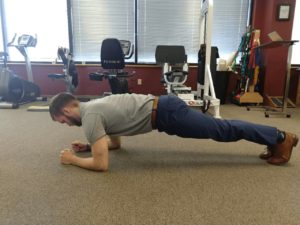
What if it’s too easy? Hold for a longer time, or lift a single arm off the ground in an alternating fashion.
What if it’s too hard? Start with your hands on a sturdy bench or counter, with your feet still on the ground.
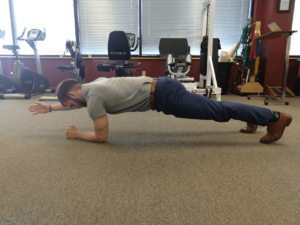
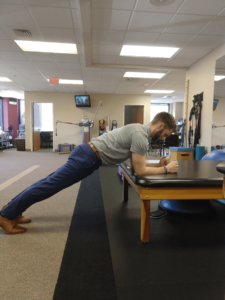
SUMMARY: With a few, specific exercises you can significantly improve your physical capacity, strength, and risk of injury.These exercises can and should be performed by all ages, though modifications may be made. Enjoy your spring and summer without the risk of injury, and with better strength and self-confidence.
Chris Donohue, PT, DPT, CSCS
Premier Orthopaedics
Learn more about Premier Physical Therapy here.
